Excavation Contractors Connersville
Best Excavating Contractor in Connersville
Get up to 3 Excavation Contractors quotes for your project today! Compare profiles, reviews, accreditations, portfolio, etc... and choose the best offer.
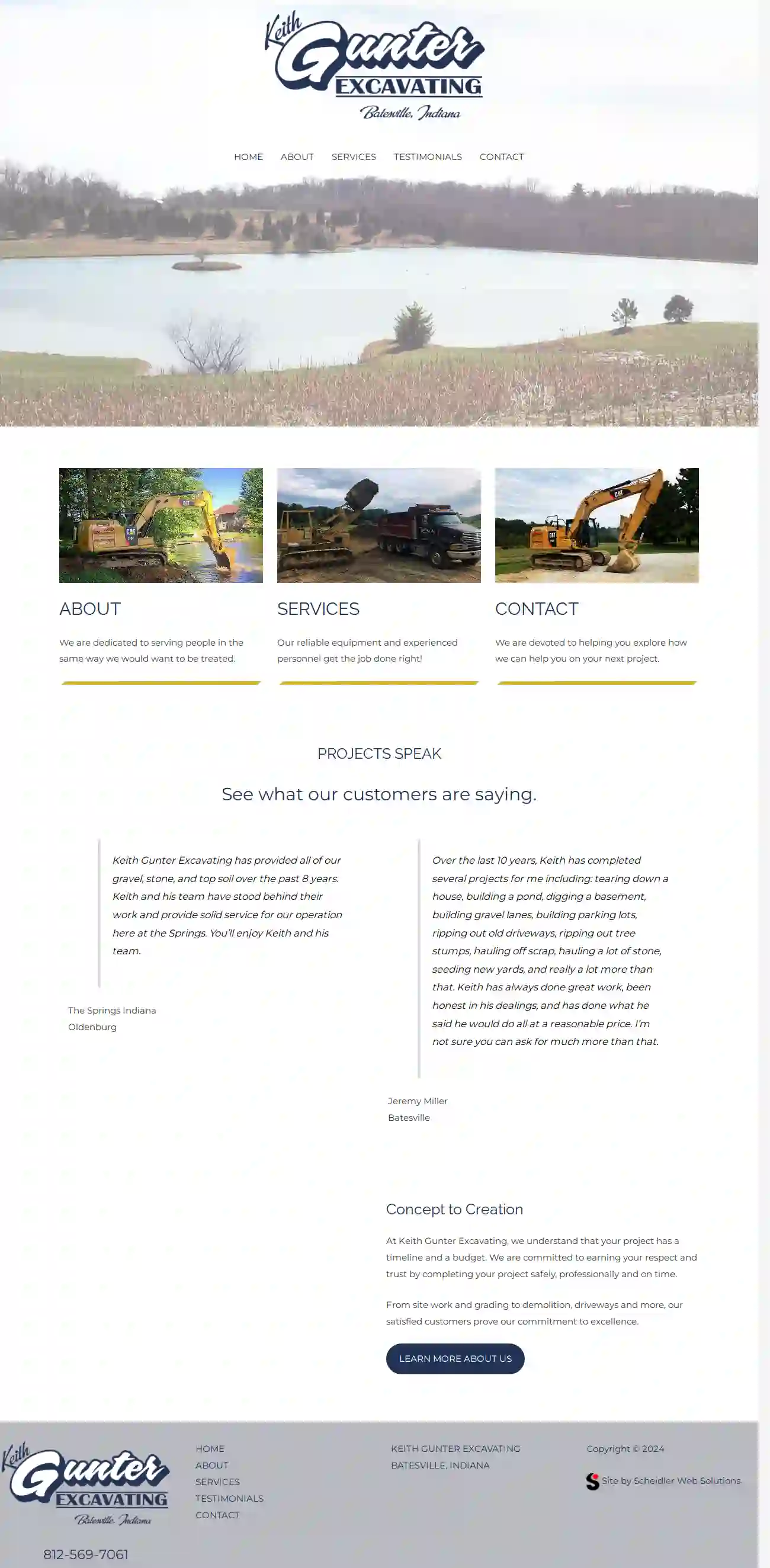
Keith Gunter Excavating LLC
515 reviewsBatesville, USWho We Are. Welcome to Keith Gunter Excavating! Keith Gunter Excavating is a third-generation, family-owned business based in Batesville, Indiana. With nearly 60 years of combined excavating experience, Keith and his team handle the ‘dirty’ work, Abby ‘digs’ handling the books, and the two youngest Gunter girls are ‘entrenched’ with looking cute and having fun. Keith Gunter Excavating offers a full-range of residential and commercial services across Southeastern Indiana. We are qualified to handle a variety of projects and will work hard to ensure you are completely satisfied!
- Services
- Why Us?
- Testimonials
- Gallery
Get Quote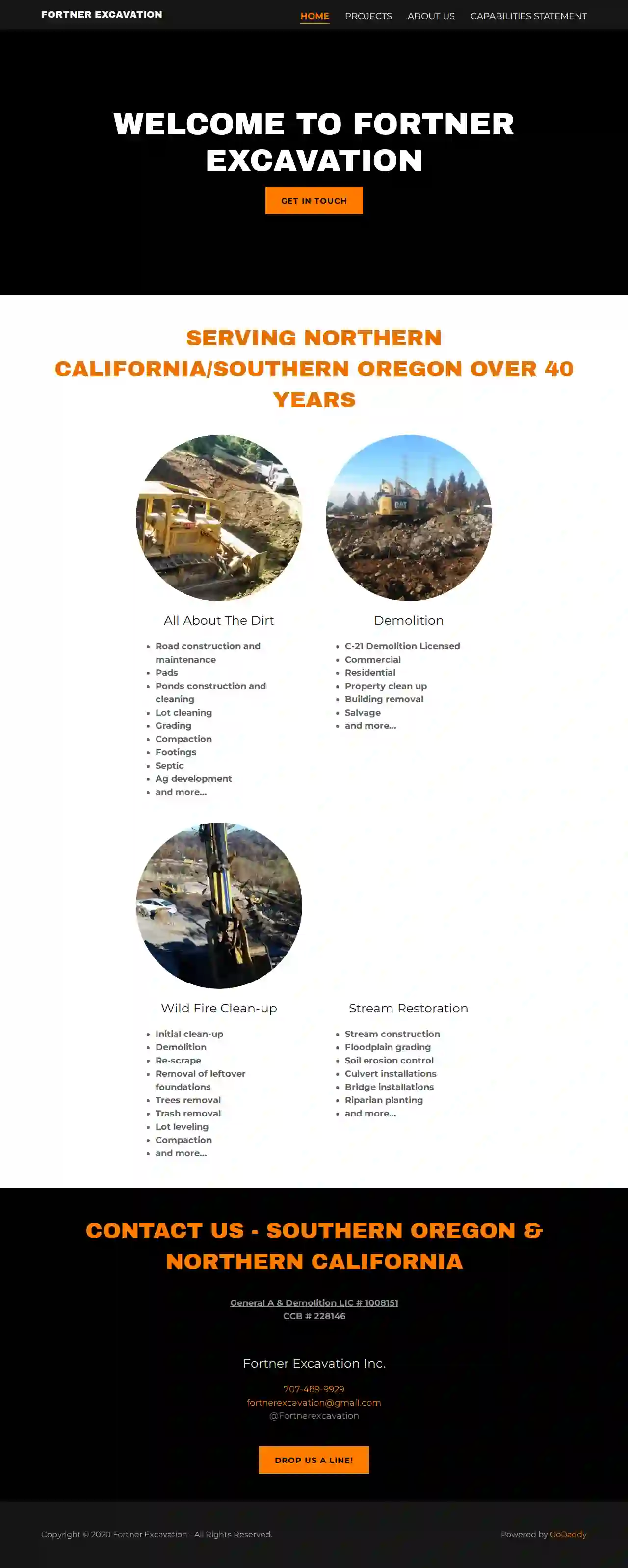
Fortner Excavation, Inc.
Chico, USAbout Us Bobby and Delaine Fortner started with 1 Backhoe and a beat up old Dump truck in December of 1979. They had a $300 payment on that backhoe and sweated every month to pay that payment. They loved it though. They wanted to be independent, self employed business owners. Since that time they have grown a little each year. Now in 2020, along with their 2 sons, they are continually making this business grow and evolve. Travis and Jeff are owners and Shareholders. We Are Expanding We are now located in the Medford and Southern Oregon area. Jeff Fortner is our “Go To Guy” for all the Jobs in that area. He is constantly working towards keeping the company running smoothly. Travis Fortner has a Tree Hedging company in addition to excavation at the Chico location and is still involved and bringing us lots of work and helping out on the side lines. Family Owned, Locally Grown We are 2nd and 3rd generation to Northern California. And we have expanded to Southern Oregon. We live and work here so we care about our customers and our quality of workmanship on every job. We are licensed to do excavation and demolition.
- Services
- Why Us?
- Our Team
- Gallery
Get Quote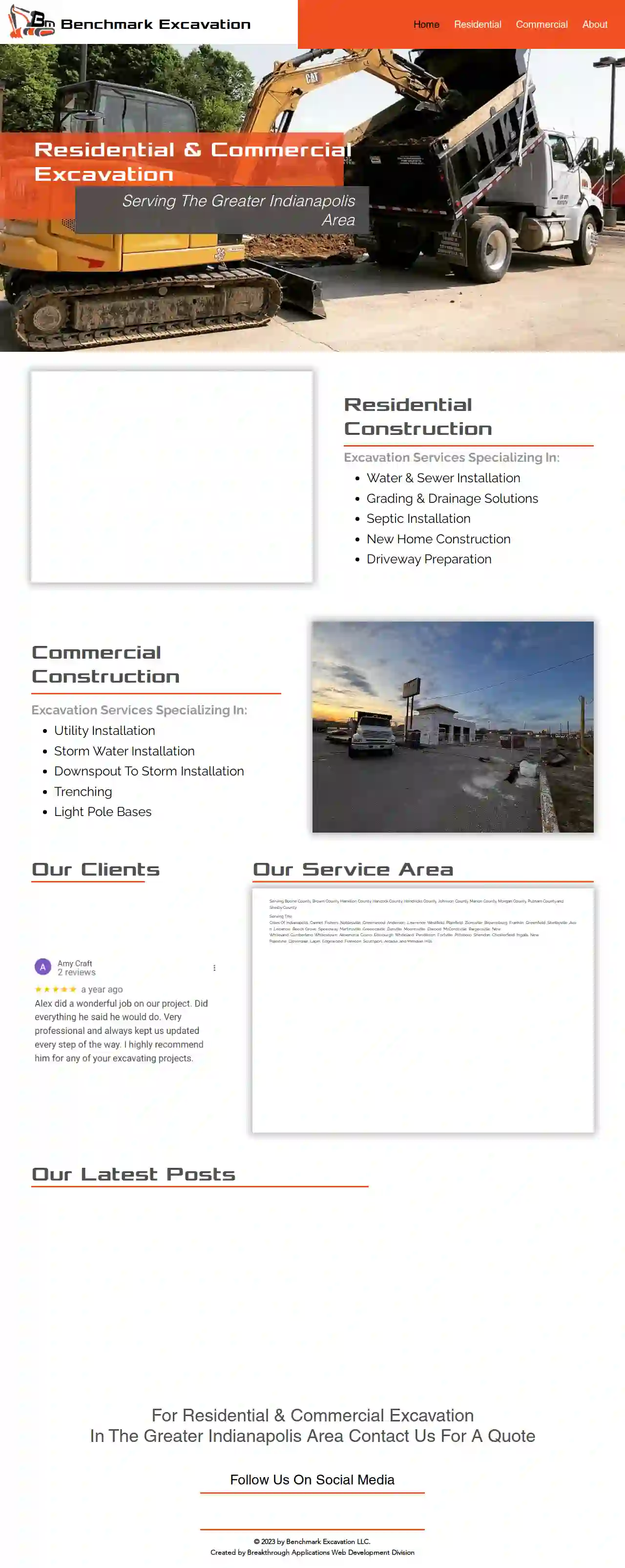
Benchmark Excavation LLC
517 reviewsIndianapolis, USBenchmark Excavation Serving Boone County, Brown County, Hamilton County, Hancock County, Hendricks County, Johnson County, Marion County, Morgan County, Putnam County, and Shelby County. Serving The Cities Of Indianapolis ,Carmel ,Fishers ,Noblesville ,Greenwood ,Anderson ,Lawrence ,Westfield ,Plainfield ,Zionsville ,Brownsburg ,Franklin ,Greenfield ,Shelbyville ,Avon ,Lebanon ,Beech Grove ,Speedway ,Martinsville ,Greencastle ,Danville ,Mooresville ,Elwood ,McCordsville ,Bargersville ,New Whiteland ,Cumberland ,Whitestown ,Alexandria ,Cicero ,Edinburgh ,Whiteland ,Pendleton ,Fortville ,Pittsboro ,Sheridan ,Chesterfield ,Ingalls ,New Palestine ,Cloverdale ,Lapel ,Edgewood ,Frankton ,Southport ,Arcadia ,and Meridian Hills. Our Clients Our Service Area Residential & Commercial Excavation Serving The Greater Indianapolis Area Contact Us Residential Construction Excavation Services Specializing In: Water & Sewer Installation Grading & Drainage Solutions Septic Installation New Home Construction Driveway Preparation Contact Us Today 1.310.703.4478 Commercial Construction Excavation Services Specializing In: Utility Installation Storm Water Installation Downspout To Storm Installation Trenching Light Pole Bases Contact Us Today 1.310.703.4478
- Services
- Why Us?
- Gallery
Get Quote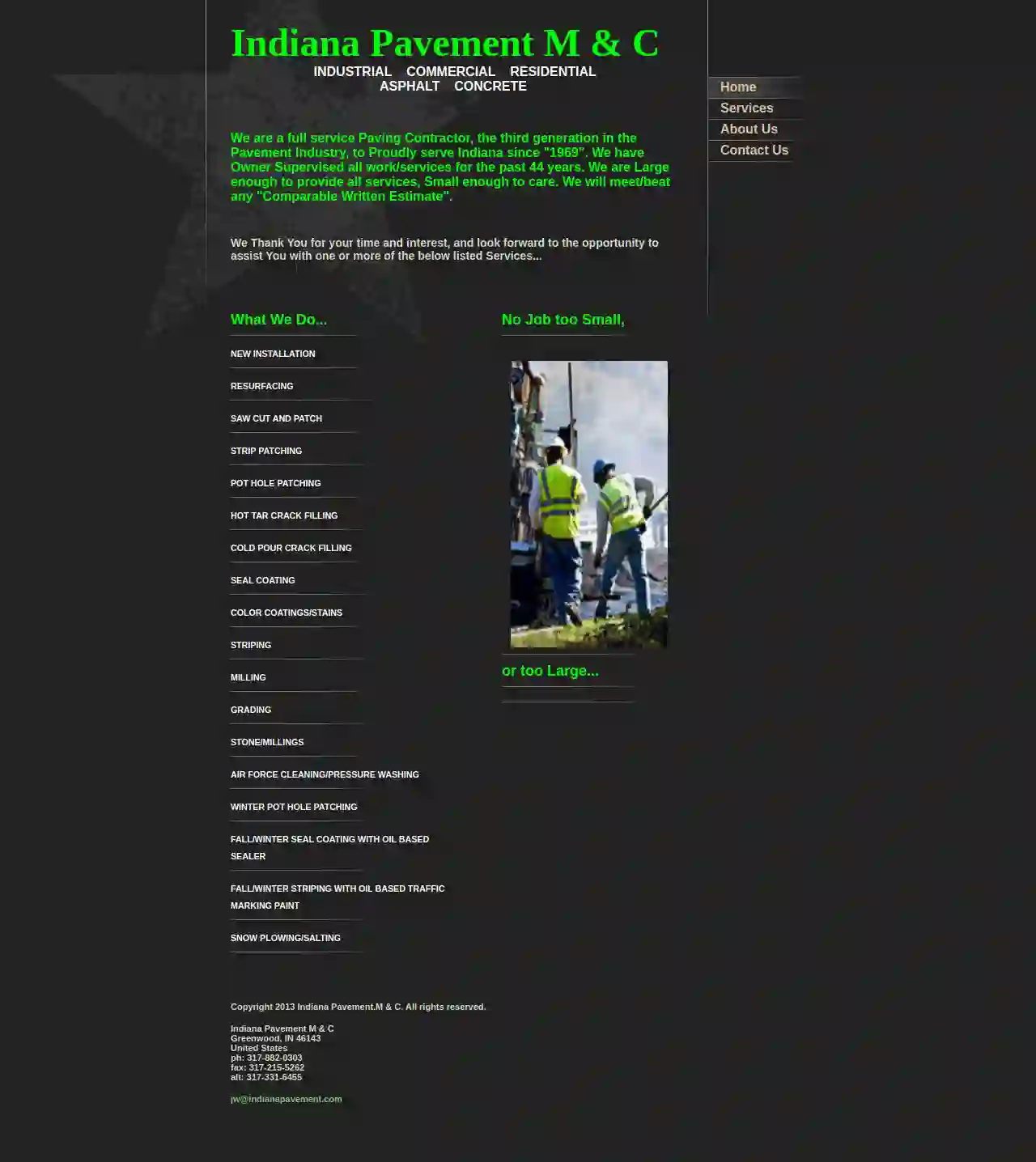
Indiana pavement M & C
4.325 reviewsGreenwood, 46143, USIndiana Pavement M & C: Your Trusted Paving Partner Indiana Pavement M & C is a family-owned and operated paving contractor with a rich history spanning three generations. Since 1969, we've been serving Indiana with pride, providing top-notch paving solutions for residential, commercial, and industrial clients. Our commitment to quality and customer satisfaction has earned us a reputation as a reliable and trustworthy partner in the pavement industry. We take pride in our owner-supervised approach, ensuring every project is completed to the highest standards. Our team is large enough to handle any project, yet small enough to provide personalized attention and care. We believe in transparency and offer competitive pricing, always striving to meet or beat any comparable written estimate. We are dedicated to providing a wide range of services to meet your specific needs. From new installations to repairs and maintenance, we have the expertise and experience to handle it all. We are committed to delivering exceptional results that enhance the beauty and functionality of your property. We understand the importance of protecting your investment. Our services, such as crack filling and seal coating, are designed to preserve your pavement and prevent costly repairs down the line. We are confident that our work will exceed your expectations and leave you with a lasting impression. Contact us today for a free consultation and estimate. We look forward to partnering with you on your next paving project.
- Services
- Why Us?
- Gallery
Get Quote
English Excavating
4.615 reviews7402 Lake Road, Indianapolis, 46217, USAbout Us We're a complete site development company as well as a service/repair company. Our work scope includes earthwork and site grading, building demolition, tree clearing plus erosion control. We can do a 1-day project or build subdivisions with 10-acre lakes. Our goal is to provide our clients with a strong responsive excavation team that knows how to get the job done correctly, on time, within budget and with pride. Install Throughout our 60-year history starting with Lowell English, Mark and Mick English have devoted their resources to knowing every project inside and out so that every project satisfies the customer. You can count on us for underground water line installation, sewer line repair, drainage excavation and more. Our knowledgeable crew is also capable of servicing city sewers and city water lines. Repair Hard work, ambition, safety, honesty, and the desire to be a superior presence in a demanding business have won our reputation of quality and dependability. Our company was founded on the premise that quality construction principals and attention to detail should be our standard. And it does not stop with the construction of a project. Service afterwards has always been a part of our tradition and commitment.
- Services
- Why Us?
- Our Team
- Testimonials
- Gallery
Get Quote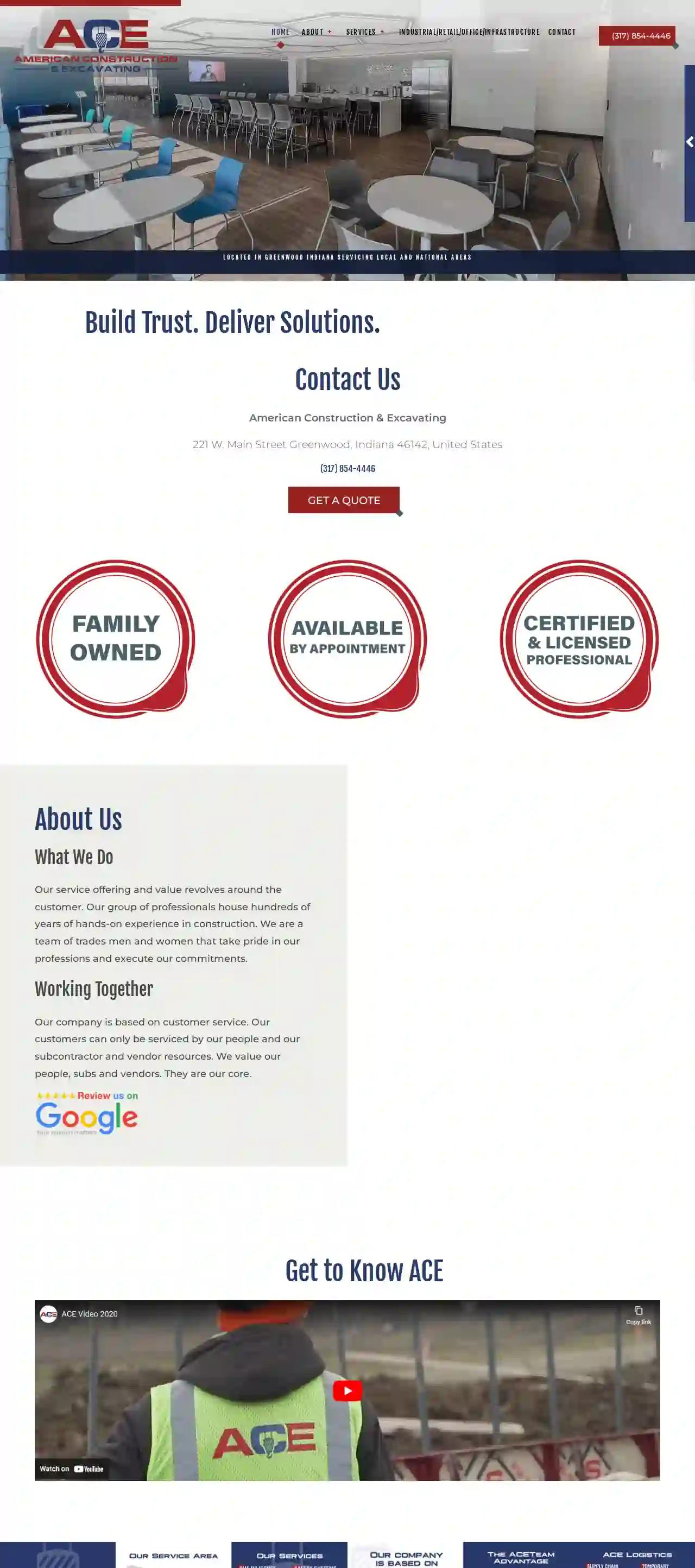
American Construction & Excavating LLC
221 W. Main Street, Greenwood, Indiana 46142, United States, 221 W. Main Street Greenwood, 46142, USAbout Us Our service offering and value revolves around the customer. Our group of professionals house hundreds of years of hands-on experience in construction. We are a team of trades men and women that take pride in our professions and execute our commitments. Working Together Our company is based on customer service. Our customers can only be serviced by our people and our subcontractor and vendor resources. We value our people, subs and vendors. They are our core.
- Services
- Why Us?
- Testimonials
- Gallery
Get Quote
Valpo Excavation & Septic
1101 Cumberland Crossing Drive, Suite 223, 1101 Cumberland Crossing Drive Suite 223, Valparaiso, 46383, USValpo Excavation & Septic: Your Trusted Excavation Partner in Northwest Indiana At Valpo Excavation, we are dedicated to delivering exceptional service with every project. Our team boasts years of experience in professional excavation, grading, trenching, site preparation, septic installation & repairs, and a wide range of other services. We are equipped with the most reliable equipment and skilled professionals to handle any excavation, septic, and foundation needs. When you require groundwork in Northwest Indiana, we are your one-stop solution. We understand that site preparation is crucial for any construction project. We offer a comprehensive suite of services, from grading and trenching to foundation installation. Our team at Valpo Excavation & Septic has extensive experience in heavy construction and will execute your sitework with precision and efficiency. Valpo Excavation is a locally-owned and operated company founded by Russ Buechs, a man driven by the American Dream. Russ is a family-oriented businessman committed to providing a fulfilling life for his family. This dedication led him to establish this family-owned, faith-based company from the ground up. He built this company with honesty, trustworthiness, and integrity as core values. His mission is to provide solid foundations for every home and business throughout Northwest Indiana. From initial site preparation to the laying of foundations and utilities, Valpo Excavation can handle it all with expertise and reliability. For over 15 years, Russ has been a dedicated professional in heavy construction. He possesses experience in every stage of home building, from foundation work to gutter installation. Additionally, his multi-year mission work in Guatemala provided him with valuable experience in concrete pouring. Russ's diverse experience makes him highly knowledgeable and prepared to deliver exceptional results. At Valpo Excavation, we provide excavation services, sitework, clear cutting, trenching, land grading, flatwork, and foundation work for any home or business in Northwest Indiana. We collaborate with both contractors and individual homeowners or business owners. Whatever your excavation needs may be, we have the solution.
- Services
- Why Us?
- Gallery
Get Quote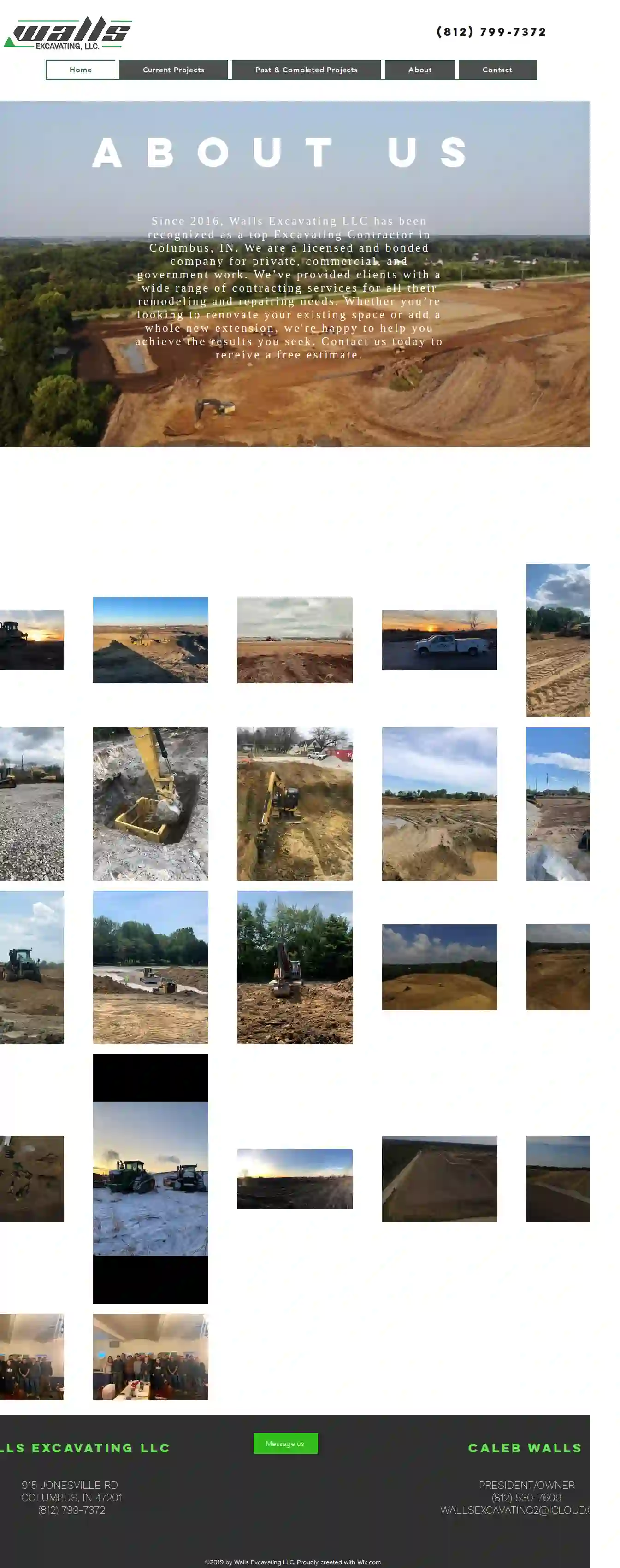
Walls Excavating LLC
3.73 reviews915 JONESVILLE RD, Columbus, 47201, USAbout Walls Excavating LLC Since 2016, Walls Excavating LLC has been recognized as a top Excavating Contractor in Columbus, IN. We are a licensed and bonded company for private, commercial, and government work. We’ve provided clients with a wide range of contracting services for all their remodeling and repairing needs. Whether you’re looking to renovate your existing space or add a whole new extension, we're happy to help you achieve the results you seek. Contact us today to receive a free estimate.
- Services
- Why Us?
- Our Team
- Gallery
Get Quote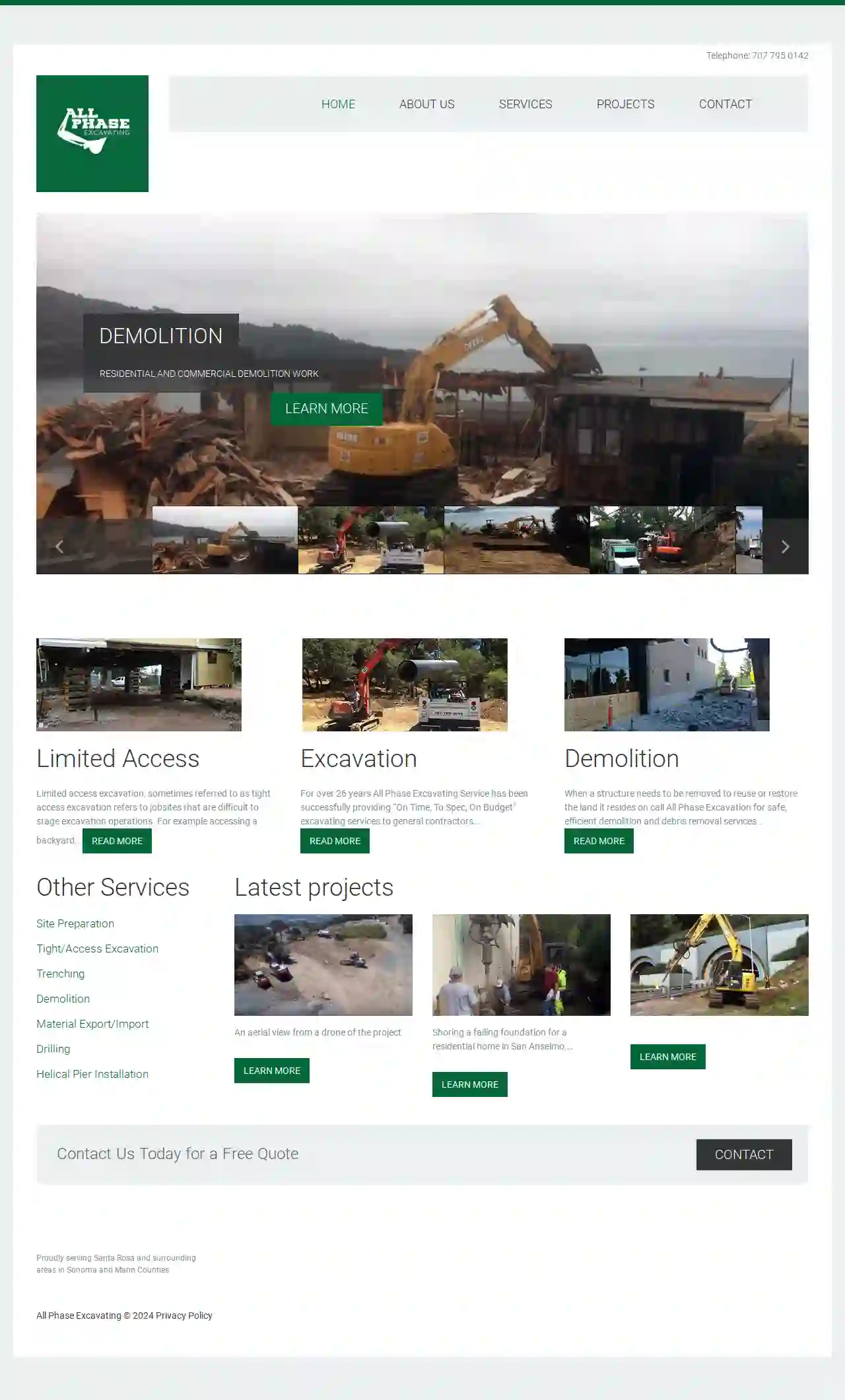
All Phase Excavating Inc
32 reviewsGary, USAbout All Phase Excavating "On time and on budget" is the goal of every excavation service company and at All Phase Excavation Service we add "done to perfection" to that tag line. When the carpenters show up to build the forms they'll find a site that is excavated to specifications, minimizing unnecessary work. We understand that a general contractor's primary concerns when selecting an excavation service include experience, capabilities, capacity, reliability, flexibility and of course a fair price. Excavation is typically the first task in starting a project and if that task is not performed to spec or is delayed it can have a serious impact on the success of the overall project. We understand the importance of being reliable and are prepared to perform the job as expected. The company started when founder and owner Vince Cheney launched All Phase Excavating in May of 1998 with a single bobcat and a pickup truck. He figured the way to be successful as a business owner is to do what you do best. "I really do enjoy excavating. I get a kick out of it and I decided that as I grew I would surround myself with other people who liked working excavation as much as I do." Serving Marin, Napa and Sonoma counties All Phase Excavating is headquartered in Penngrove with an equipment yard centrally located in Sonoma County. All Phase Excavating has grown from a single bobcat and a truck to 22 pieces of excavating and hauling equipment specifically acquired to tackle client needs. All Phase Excavating has the capability to tackle any excavating project large or small, from ground clearing to hauling debris. If It's an Excavating Challenge We Want a Shot at It As a general contractor you may not be overly concerned if your excavator is has a passion for moving earth but if you think about it, people who really enjoy their work are typically better at it than most. They see difficult jobs as a test of their skill and that's why we excel at tight access, hillside excavation, full and partial structure demolition and abatement and other demanding excavating projects. Vince is personally involved onsite in every project often working side by side with his crews. This onsite management involvement assures quality work and allows for streamlined communications with the general contractor. All Phase is a Responsible Community Business Is there a Californian that is not aware of the state's efforts to protect and improve our environment? At All Phase Excavation we are in full compliance with requirements with DPF requirements and our abatement service
- Services
- Why Us?
- Gallery
Get Quote
K & K Excavating Inc
515 reviewsIndianapolis, USABOUT K&K EXCAVATING K&K Excavating is a family-owned and operated business that has been serving Southern Indiana and the Tri-State area since 1978. We have a long history of success and a reputation for providing exceptional quality and dependable service to our customers. We offer a wide range of services, including site prep, utility installation, soil stabilization, lake excavation, and truck hauling. If it involves dirt, we can do it! We are committed to providing our customers with the best possible service. We are highly skilled and reliable, and we always go the extra mile to ensure our customers are satisfied. We are proud of our family business and look forward to continuing to serve our community for many years to come. OUR SERVICES K&K Excavating offers a wide range of services to meet your needs. We are committed to providing our customers with the best possible service and results. We are highly skilled and reliable, and we always go the extra mile to ensure our customers are satisfied. We offer the following services: Excavating Trucking Pond Renovation Stabilization Mass Earthwork & Grading GPS Layout & Machine Control Deep Excavation Erosion Control Soil Stabilization Demolition We are always happy to discuss your specific needs and provide you with a free estimate. Contact us today to learn more about how we can help you! WHAT OUR CLIENTS SAY "Nice people and hard workers. Would highly recommend them." - Aaron B. "Great honest company that does great work!" - David L. "If you need dirt work, or utility installation, this is the place." - Tony F.
- Services
- Why Us?
- Accreditations
- Our Team
- Testimonials
- Gallery
Get Quote
Over 22,076+ Excavation Businesses on our directory
Our excavation companies operate in Connersville & beyond!
ExcavationHQ has curated and vetted the Best Excavation Pros arround Connersville. Find a top & trustworthy business today.
Frequently Asked Questions About Excavation Contractors
- Trench Collapses: Unstable trench walls can cave in, posing a severe risk to workers. Proper shoring and sloping are crucial safety measures.
- Utility Damage: Striking underground utilities (gas, water, electric) can cause leaks, explosions, or electrocution. Accurate utility locates and careful digging are essential.
- Falling Objects: Materials or equipment falling into excavations can injure workers. Securing work areas and using appropriate safety gear is vital.
- Equipment Accidents: Operating heavy machinery involves risks of rollovers, collisions, or mechanical failures. Trained operators and proper equipment maintenance are critical.
- Environmental Hazards: Excavated soil might contain hazardous materials (asbestos, lead). Proper testing and disposal procedures are necessary.
- Utility Locates: Contact your utility companies to mark the locations of underground lines before excavation begins. This is usually a free service.
- Hand Digging: Excavate carefully by hand near marked utility lines to avoid damage.
- Potholing: Digging small test holes to expose and verify utility depths and locations.
- Safe Distances: Maintaining a safe distance between excavation equipment and marked utility lines.
- Vacuum Excavation: Using vacuum excavation techniques to expose utilities without digging, reducing the risk of damage.
- Spring and Fall: Often considered favorable due to moderate temperatures and drier soil conditions.
- Summer: Can be suitable, but hot weather can make working conditions challenging and might require additional measures (shade, hydration) for workers.
- Winter: Excavation in winter can be more difficult due to frozen ground, snow, and potential delays caused by inclement weather. It might also require specialized equipment or techniques.
What are the risks associated with excavation?
What is the difference between topsoil and subsoil?
Topsoil: The uppermost layer, typically rich in organic matter, nutrients, and microorganisms. It's essential for plant growth and is often darker in color.
Subsoil: The layer beneath the topsoil, containing less organic matter and generally denser. It provides support for roots but is less fertile than topsoil.
During excavation, topsoil is often removed and preserved separately for later use in landscaping, while subsoil is typically used for backfilling or other less demanding applications.
How do you protect utilities during excavation?
What is the best time of year for excavation?
What are the risks associated with excavation?
- Trench Collapses: Unstable trench walls can cave in, posing a severe risk to workers. Proper shoring and sloping are crucial safety measures.
- Utility Damage: Striking underground utilities (gas, water, electric) can cause leaks, explosions, or electrocution. Accurate utility locates and careful digging are essential.
- Falling Objects: Materials or equipment falling into excavations can injure workers. Securing work areas and using appropriate safety gear is vital.
- Equipment Accidents: Operating heavy machinery involves risks of rollovers, collisions, or mechanical failures. Trained operators and proper equipment maintenance are critical.
- Environmental Hazards: Excavated soil might contain hazardous materials (asbestos, lead). Proper testing and disposal procedures are necessary.
What is the difference between topsoil and subsoil?
Topsoil: The uppermost layer, typically rich in organic matter, nutrients, and microorganisms. It's essential for plant growth and is often darker in color.
Subsoil: The layer beneath the topsoil, containing less organic matter and generally denser. It provides support for roots but is less fertile than topsoil.
During excavation, topsoil is often removed and preserved separately for later use in landscaping, while subsoil is typically used for backfilling or other less demanding applications.
How do you protect utilities during excavation?
- Utility Locates: Contact your utility companies to mark the locations of underground lines before excavation begins. This is usually a free service.
- Hand Digging: Excavate carefully by hand near marked utility lines to avoid damage.
- Potholing: Digging small test holes to expose and verify utility depths and locations.
- Safe Distances: Maintaining a safe distance between excavation equipment and marked utility lines.
- Vacuum Excavation: Using vacuum excavation techniques to expose utilities without digging, reducing the risk of damage.
What is the best time of year for excavation?
- Spring and Fall: Often considered favorable due to moderate temperatures and drier soil conditions.
- Summer: Can be suitable, but hot weather can make working conditions challenging and might require additional measures (shade, hydration) for workers.
- Winter: Excavation in winter can be more difficult due to frozen ground, snow, and potential delays caused by inclement weather. It might also require specialized equipment or techniques.